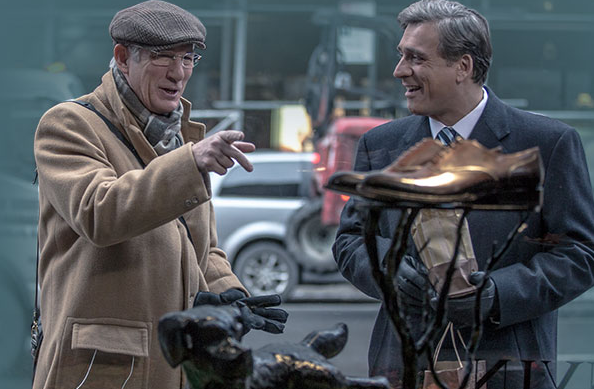Norman Oppenheimer (Richard Gere) is a curious, awkward, and struggling New York fixer, someone who incessantly hatches illicit deals and schemes. The entire world of Norman: The Moderate Rise and Tragic Fall of a New York Fixer revolves around Norman and the consequences of his ambitious endeavors, yet no one—neither characters, nor the audience—ever manages to learn anything about him.
“[Norman] was the motivation for the whole film,” director Joseph Cedar said in an interview with the Voice. “I had to figure this guy out. All the other people around Norman, at least for the world of this film, are defined by their relationship with Norman, and how they reject Norman, take advantage of him, betray him. But at the center is this one character that I needed to figure out.”
Norman is a modern take on the archetypal Court Jew story, which traditionally involves a Jew who meets a struggling man who is eventually fated to come to power, then the Jew offers the man a gift or favor, according to Cedar. Once the man is in power, the Jew rises to high office in the man’s court. Ultimately, the Jew becomes subject to antagonism, and the man in power willingly removes the Jew from his court. “He’s a liability and it’s easy to get rid of a Jew,” Cedar said.
Norman is a sharp departure from the confident, womanizing characters whom Gere has played in the past. Even so, Gere brings Norman to life with such depth that he pulls the heartbreaking theme of loneliness into every moment of the film. Visually, Norman walls himself from his surroundings with a hat, a bulky coat, and ever-present earbuds, while Gere masterfully enacts Norman’s stiffness and his quizzical facial expressions, which tell a story of their own.
Norman first appears in a New York coffee shop, entreating an uninterested man to attempt a grandiose financial scheme. As usual, Norman fails to strike a deal—but this failure is short-lived. He soon hears that an Israeli politician, the disheartened Micha Eshel (Lior Ashkenazi), is coming to New York, and so Norman, like the archetypical Court Jew, gives Eshel a gift of expensive shoes to gain a lucrative connection. Norman establishes a friendship — or something like one — still extant when Eshel becomes Prime Minister.
Later, during Eshel’s inauguration celebration, it seems that Norman has struck networking gold. Norman finds himself swimming in a mirage of faces and introductions, each one a gateway to a new scheming opportunity. By using Eshel’s name to accumulate expensive deals and transactions, Norman catalyzes his own downfall and places Eshel’s reputation in peril.
As one may expect, Norman is selfishly motivated, but not by wealth nor power. Above all else, Norman is lonely. “Loneliness is the scariest thing, in my mind, in the human experience,” said Cedar. “Everything is a little bit easier if you’re not alone. And Norman is lonely. The things that he does are a way for him to feel less lonely, or less alone… There are films about diseases, or films about social problems, wars; this is definitely a story about loneliness.”
Connections were as essential to the making of the film as they are to the plot. Norman, Cedar’s first-ever English-language film, was shot on site in New York City. “Working in a new country is almost like starting from scratch. You have to rely on other people’s experience,” Cedar said. However, through the learning process of filming, Cedar gained a new perspective of New York. “There are all these secrets about how to shoot on the street,” said Cedar. “Finding locations in New York is a way to rediscover the city.”
The product is impeccable: the storyline is moving and the acting is intriguing. The cinematography is a work of art, even while capturing events and images that are not intrinsically aesthetic. Norman is a story told through phone calls: a mode of communication that is omnipresent and unavoidable in modern life and contemporary film, and one that is also deeply representative of Norman’s detached relationships.
“There’s something boring about someone talking to a phone, or reading a text… Technology is not beautiful,” Cedar said. Cedar chose to portray phone calls with the shared screen aesthetic, which sets the images of the two speakers side-by-side, as a way to dramatize phone calls and illustrate how, through perpetual phone calls, Norman is invading other people’s space.
The buildup of events and their stunning portrayal consummates an ironic tragedy as superficial successes fail to heal Norman’s loneliness. Norman is in constant contact with his ever-growing network, but each character’s relationship to Norman is void of genuine friendship. “Norman is alone. Norman is constantly trying to interact with people… but no one ties their destiny to him. And I think that’s the meaning of not being alone,” Cedar said.
Norman becomes a generalization in himself: even his name becomes a common noun. “Norman is almost like a business tradition; it’s not only a person. Doing a Norman. Being a Norman. Afraid of the Norman. Beware of the Normans. I think I like that notion. He’s more than just this one person. There are many Normans.”
Amid the mixed results of his own life-story, Norman manages to help the off-screen audience by opening their eyes and minds. The world doesn’t necessarily need the help and favors of the Normans, but the Norman of this film needs us, needs someone who will accept his help. “I’ll accept the gift from you, and in return, you can call,” said Cedar. “That’s all he wants. Access.”
Norman: The Moderate Rise and Tragic Fall of a New York Fixer is a poignant tale of one person’s loneliness within a popular ignorance. Through a story that aims to redefine divisive and superficial stereotypes, the mysterious Norman Oppenheimer invites the world to care to understand.





